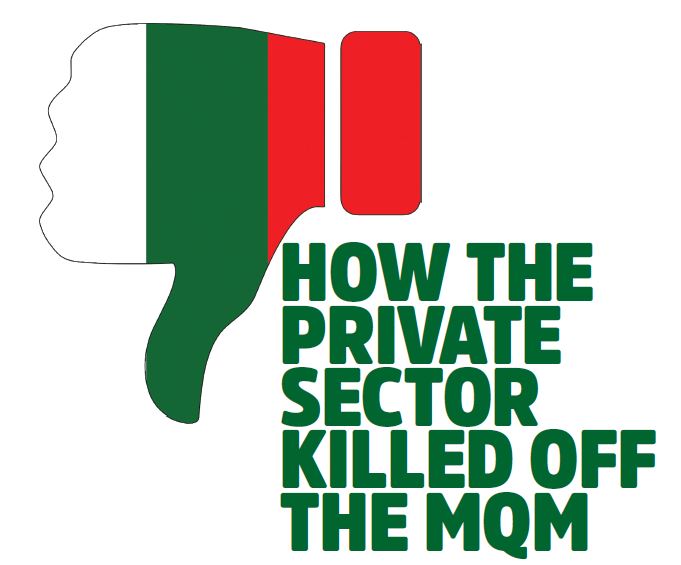
If there is one thing that became abundantly clear in the 2018 elections, it is that the Muttahida Qaumi Movement (MQM) is well and truly dead. Why is a business magazine talking about the death of a political party, you might ask? Because the death was caused primarily by economic factors.
While it is true that many elements of the Establishment certainly seemed gleeful at the prospect of the MQM’s death and appeared to do everything within their power to hasten the demise of the party that claims to represent the interests of Muhajirs in Pakistan, they were by no means its primary undertakers.
To put it simply, the MQM is dying because it has no reason to live anymore. And while some of its supporters still cling on to its slogans as comfortable relics of the past, the MQM cannot escape reality: Muhajirs are not a threatened ethnic group in Pakistan and a party that sustains itself on stoking a sense of fear within that ethnic group will strangle itself to death.
To understand why the MQM is dying, you do not need to watch Altaf Hussain’s speeches, nor do you need to learn about the Army operation in Karachi, and most certainly don’t listen to the know-nothing talking heads on television. You do not even need to talk to Muhajirs about their political views. All you need to do is stand on the sidewalk on I.I. Chundrigar Road in Karachi at 9 am on a weekday morning. Stand in front of any building and ask the young men and women going into those buildings just two questions: how much money do you make, and how much money do your parents make?
While you will meet many sons and daughters of comfortably middle-class families, you will also meet the 24-year-old commercial banker at Bank Alfalah, making Rs40,000 a month, whose father is a rickshaw driver scraping by on Rs15,000 a month. You will meet a young accountant at PricewaterhouseCoopers whose parents own a fruit cart and barely make it above the poverty line. And you will meet the young lawyer whose father owns a small paan shop on a street corner in one of the many working-class neighbourhoods of the city.
These young men and women have one thing in common: they have managed to secure a ticket out of their working-class background into Pakistan’s rising and increasingly affluent middle class, and they did not need a government job to do so. Some, maybe even most, did not even need a government-subsidised education to get there either.
Why is this relevant to the MQM’s imminent death? Because the fundamental premise that justified MQM’s existence in the first place was the notion that Muhajirs were being prevented from gaining access to economic opportunities by virtue of their ethnicity.
Muhajir resentment emerged in the early 1970s when, after two decades of dominating the Civil Service of Pakistan, they were finally forced to make room for people from other ethnic groups in the country through the introduction of geographic quotas for government jobs. Of course, Muhajirs did not see it as an injustice being corrected: they had been raised to view other ethnic groups as unworthy cretins and saw this policy measure as the death of meritocracy.
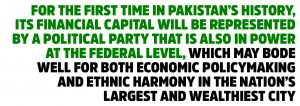
Built on half-truths and lies though it was, that culture of resentment at least held some credence when the government was the dominant economic actor and the only paths to upward economic mobility relied on access to political patronage and a government job for yourself or for one of your family members. But as the economy liberalized in the early 1990s onwards, there is now no longer just one path to the Pakistani upper middle class: there are many, and many of them are controlled by Muhajirs themselves.
In other words, the economic anxieties of the 1970s that animated the rise of the MQM no longer exist. The fastest path to the upper middle class life in Pakistan is no longer through the government but through Corporate Pakistan. The smartest students no longer want to attend the PMA at Kakul on their way to becoming colonels and generals, nor Government College Lahore on their way to becoming DMG officers. They now want to attend LUMS and IBA on their way to becoming brand managers at Procter & Gamble and Unilever.
The government no longer controls access to economic opportunity through patronage, and so the democratic order no longer threatens Muhajir economic interests. It did when they relied on the disproportionate power in the civilian bureaucracy that was only possible through undemocratic control. The geographic quotas remain, but Altaf Hussain’s successors at the University of Karachi either no longer care, or are no longer threatened by them. Even if you want a government job as a Muhajir, there are now so few people applying from Urban Sindh that the quotas perversely begin to work in your favour.
In short, Muhajirs no longer need the MQM to guard their narrow ethnic economic interests in the federal government because those interests no longer hinge around government jobs. Now they have a much wider set of economic interests and need a party that is interested in governing the country’s largest city and providing it with a functioning infrastructure.
Under the Musharraf Administration, it had briefly felt possible that the MQM could make the pivot from being the insurgents to being the responsible governing party. Then came the politically brilliant PPP ploy in 2011 of using Zulfiqar Mirza to make the MQM go back on the ethnic defensive, and all of a sudden the MQM’s evolution stood aborted. The party reverted to being the well-organised gang of thugs it always was.
Some observers, such as Zarrar Khuhro in the Herald, argue that the MQM needs to find a post-Altaf Hussain strategy to survive. While Khuhro’s analysis of the break-down of the MQM is very well laid out, I argue that no viable recovery strategy exists.
The 2018 elections showed that Muhajirs have reverted to their pre-1988 voting patterns of voting for national parties and in the Pakistan Tehrik-e-Insaf (PTI), many of them have found one they can accept. Indeed, the leadership of the PTI on economic matters appears to be largely from Karachi, and includes the first generation of professionals who made solid middle class careers in Corporate Pakistan, and not through government.
Meanwhile, for the first time in Pakistan’s history, its financial capital will be represented by a political party that is also in power at the federal level, which may bode well for both economic policymaking and ethnic harmony in the nation’s largest and wealthiest city.



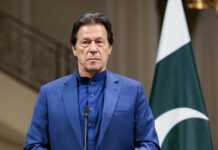
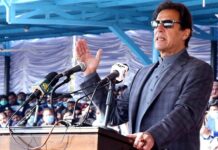
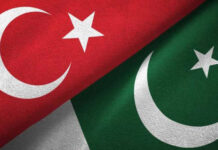

Excellent article. Although I wont underestimate the emotional attachment some people still have towards a party representing their ethnicity, but Karachi public, which has one of the highest literacy rates in Pakistan, now knows what is better for them.
I agree with your assessment entirely as this is a view I have held for a few years now.
Facts: MQM was created during Gen Zia’s era by “The Khakis” to dilute the influence of PPP & religious parties in Karachi. Khaki’s change of heart in 2014 tilted towards PTI and they engineered/faciliated the present political accordingly (note: pti & mqm coalition). * Khakis are the most powerful political party since 1951. Rest is all eye-wash. Nothing new under the sun!
Very well biased statement : “The party reverted to being the well-organised gang of thugs it always was.” Wait for it… you may need to write a new article very soon..
Too generalized of an analysis. It’s absolutely true for the upper middle class. The bulk of votes for this party come from a vast number of lower middle class population who do not have access to the education that would allow them to make it to the respectable positions in the private sector. For them these problems remain with quota remain. So, no, not true in its entirety.
A play full dream
Bullshit political rights are still missed in Karachi guy has no idea about the foundation of MQM it was not only economic. Its about capture of resources of Karachi people and converted the population mohajir in minority is the major cause and its still exist. Is Mohajir here for private sector what about government jobs??
If you still consider yourself to be a Muhajir, why are you trying to own Karachi, which is entirely a pure Pakistani city. Either stop calling yourself Muhajirs or go back to your caves.
Cut your bullshit … we are still mohajirs and because of us you pakistan is made. We are proud to be mohajirs
If they are thugs, then why pti is compromising and making them ally. Stop being a hypocrite and try to understand each others background before making such stupid and ludicrous statements
This is called ” sastay nashay ka anjam”
Purely a generalized statement.No government jobs for Muhajir during last 10 years in GOP or GOS.A true survey will bring the fact that Muhajir are not more than 5% in GOS.The author talk about I.I.Chundrigar Road overloaded with employees of private businesses,whereas during last 40 years i didn’t see any new offices coming up at this place as no new building has been constructed there.Please visit industrial area and u will find the bulk doing manual jobs.
Quota system was an Injustice being corrected !!
So for the writer, it was not injustice that only in Sind an “Injustice” was corrected. Why it was not implemented in Punjab / NWFP / Balochistan?
Also, the economic situation changed suddenly in 2018 elections time.. The “Bank Al Falah employee” was not born at the time of Local Bodies elections where MQM won just 3 years back?
The article is not only factually incorrect, it also has a smelly bias all over it.
This article is based on the results of 2018 elections. Post elections, typically we have the luxury of analsying based on facts, provided that the elections were free and fair. Since 2018 elections were massively rigged, pre-poll and post-poll, we are now back to discussions based on opinions. This article is author’s mere opinion, which I respect, but don’t agree to.
On the one hand you won’t find any evidence of rigging in this election. However you will find tons of evidence and videos of thappa mafia in 2013 and previous elections. You can also just review the results of individual polling stations in 2013 elections to see the extent of rigging at that time.
I will share my personal experience. When we all went to vote in 2013 elections, there was a huge crowd and line full of PTI supporters. The same scene was visible in most polling booths in Karachi. I’m sure if you went out in 2013 elections, you would have seen the same. They all went in cast the vote and PTI was expected to win a lot of seats from Karachi. It took me 3 hours. However something happened after 3 pm, when MQM leadership suddenly realized and then polling station doors were closed. When the result came for that particular polling station where I voted, the result was MQM 5000, PPP: 0, PTI: 0, JI: 0, PML(N): 0. That was the extent of riggiing that time!
MQM is a major power no doubt in Karachi. But its mandate in past elections was grossly magnified due to thappa mafia. 2018 was the only elections since past many where they were not allowed to engage their ever efficient and organized thappa mafia and that’s why they lost.
Hardly the case… PTI took 2013 elections case to the court, chief justice led bench declared the 2013 elections largely fair, with some irregularities and asked EC to act on them. Not saying that MQM is fault free and there were no rigging at all in 2013, I am sure some incidents did happen.
2018 elections are, without an iota of doubt, were hugely rigged. SMQ has announced on the floor that parliamentary committee comprising of both gov and opposition MNAs, so jury is still out on 2018 elections. Just a few pointers for you, the number of PTI votes in Karachi in 2018 v 2013 didn’t increase by any significant margin, while the seats went up from 1 to 14, that should tell you which election was rigged. Secondly, RTS system alleged mal-function (which we now know that it was a lie) and throwing out of agents of each candidates at the time of counting… there are clues for you in it.
MQM create threats for businessmen in Karachi. This party should be ban.
Comments are closed.